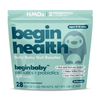4 Infant Gut Health Tips from an Registered Dietitian
share this article

Ensuring your infant's gut health is vital for their overall well-being and development. A healthy gut can improve digestion, boost the immune system, and even influence mood and behavior. Here are four tips our Registered Dietitians on how to support and enhance your infant's gut health:
1. Breastfeeding: The Gold Standard for Gut Health
Breastfeeding is highly recommended for infants as it provides essential nutrients and beneficial bacteria crucial for gut health.
- A study published in Pediatrics found that breastfed infants have a more diverse gut microbiome compared to formula-fed infants, which is linked to better immune function and lower risk of infections [1].
- According to the Journal of Human Lactation, breast milk contains oligosaccharides, which act as prebiotics, feeding beneficial gut bacteria and promoting a healthy gut flora [2].
Breastfeeding also transfers antibodies from mother to baby, further strengthening the infant's immune system. The World Health Organization recommends exclusive breastfeeding for the first six months to ensure optimal health benefits.
2. Introduce Solid Foods Gradually and Include Probiotics
When introducing solid foods, it's important to do so gradually and include foods rich in probiotics to support gut health.
- The Journal of Pediatric Gastroenterology and Nutrition emphasizes starting with simple, single-ingredient foods and progressively increasing complexity as the infant's digestive system matures [3].
- Probiotic-rich foods, such as yogurt and kefir, can help establish a healthy gut microbiome. A study in the American Journal of Clinical Nutrition found that infants who consumed probiotics had a more balanced gut microbiota and fewer digestive issues [4].
Probiotics can also help prevent common gastrointestinal problems in infants, such as colic and constipation, by promoting a healthy balance of gut bacteria.
Begin Health Expert Tip
Bifidobacteria is a good gut bacteria commonly found in the gut of healthy babies. However, studies reveal that 9 out of 10 babies have a gut microbiome deficiency, where they lack critical Bifidobacteria the gut needs to thrive. Beginbaby Prebiotic + Probiotic is specifically made for babies who need more nutrition support and combines HMOs with Bifidobacteria to help them restore good gut bugs, ultimately helping improve digestive and overall health.
3. Avoid Antibiotics Unless Absolutely Necessary
Antibiotics can disrupt the balance of gut bacteria, so they should be used only when absolutely necessary and prescribed by a healthcare provider.
- A study in JAMA Pediatrics reported that early and frequent use of antibiotics in infants can lead to long-term changes in gut microbiota and increase the risk of obesity and other health issues later in life [5].
- The New England Journal of Medicine found that antibiotics can reduce the diversity of the gut microbiome, making the gut more susceptible to infections and imbalances [6].
To mitigate potential negative effects, consider giving your infant probiotics after antibiotic treatment, as suggested by the Journal of Family Practice [7]. This can help restore the beneficial bacteria in the gut.
Daily reads to help your little ones lead happier and healthier lives.
Join the
Happy Gut Club
4. Encourage a Fiber-Rich Diet
As your infant grows and starts eating a variety of solid foods, a fiber-rich diet is essential for maintaining gut health.
- The Journal of Nutrition highlights that dietary fiber supports the growth of beneficial gut bacteria and improves bowel regularity [8].
- Foods like pureed fruits, vegetables, and whole grains are excellent sources of fiber for infants. A study in Pediatric Research found that infants who consumed higher amounts of fiber had a more diverse and stable gut microbiome [9].
Fiber acts as a prebiotic, feeding the good bacteria in the gut and promoting a healthy digestive system. It can also help prevent constipation, a common issue in infants transitioning to solid foods.
Summary
Promoting infant gut health involves breastfeeding, gradually introducing solid foods, introducing a prebiotic and probiotic such as Beginbaby Prebiotic + Probiotic, avoiding unnecessary antibiotics, and ensuring a fiber-rich diet. These strategies can help establish a healthy gut microbiome and contribute to your infant's overall well-being.
















